
Cities striving toward energy-efficient transportation
Cities striving toward energy-efficient transportation
The United States is a nation of commuters. Per one estimate, there will be a projected 281.3 million registered vehicles on American roads in 2019, with 35% being passenger cars. This vehicle use is contributing to atmospheric pollution; the Union of Concerned Scientists estimated, in 2016, that the United States dumped 4.8 billion metric tons of carbon dioxide from fuel combustion into the atmosphere. This translates to roughly 15 metric tons per American resident.
Because of urban sprawl, most U.S. states require residents to drive a vehicle or use public transportation to access basic services. Population booms mean most communities follow the suburb-model, where many services, like malls and major retailers, are located outside of city limits. This makes the average city unwalkable. With 45% of Americans having no access to public transportation, this suburb-model has effectively created a barrier to the poor from seeking work, having ready access to much-needed public services, or even buying food.
There are strategies available for cities that seek to remedy these issues. Expanding the public transportation network, building affordable housing on or near public transit routes and hubs, offering incentives for reduced or free public transit use, converting part or all of an existing fleet to efficient renewable energies, and enforcing safe street policies can all help to improve transportation access. However, as these upgrades are costly, the initiative to retrofit may be limited to cities with a populace that would actively seek it. Cities with a high population of college graduates, cities with existing housing or transportation problems, and cities with a large progressive base are all good candidates for enacting change.
Stacker has composed a list of 30 cities striving towards more energy-efficient transportation. To complete this list, Stacker consulted the 2019 City Energy Scorecard from the American Council for an Energy-Efficient Economy (ACEEE). ACEEE ranked 85 cities on their local policies in five areas: local government, community-wide initiatives, buildings policies, energy and water utilities, and transportation policies. Here, we have ranked the 30 cities with the highest transportation scores, with ties broken by cities' overall clean energy scores. We also included information on state transportation policies from ACEEE's 2018 State Energy Scorecard.
Keep reading to see if your hometown made the list.
You may also like: 15 careers to make the ocean your office
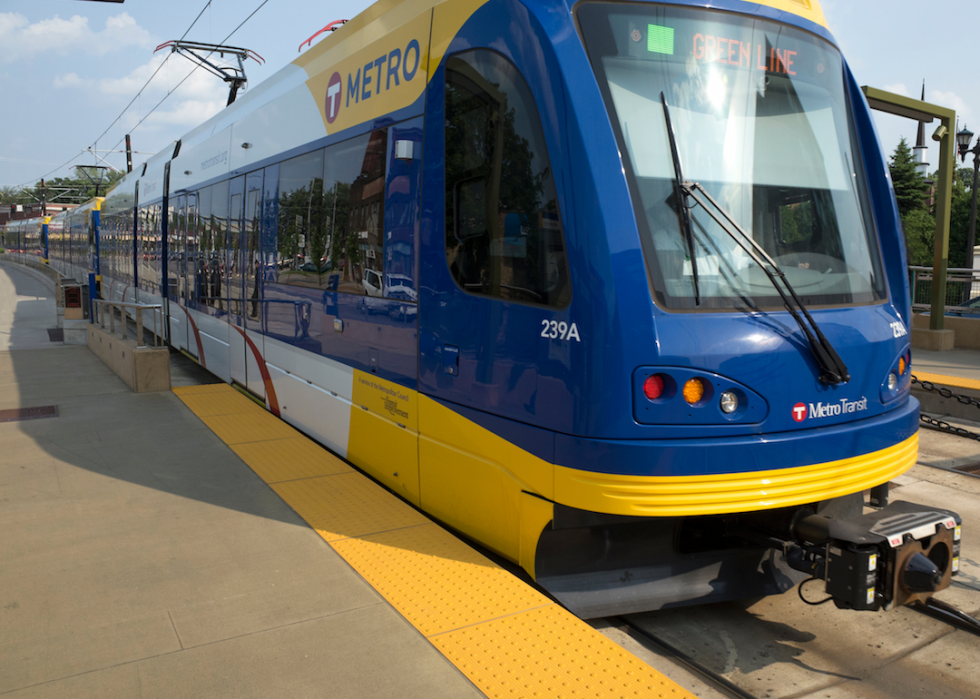
#30. Saint Paul, MN
- Transportation policies score: 12 (out of 30 points; 3.5 points above national median)
- Overall city score: 35 (out 100 points; overall city rank: #37)
- State transportation policies score: 4 (out of 10 points; state rank: #21)
The 2007 collapse of the Interstate-35W bridge led the city to update the existing infrastructure around St. Paul while reducing road congestion. The Twin Cities (St. Paul and Minneapolis) have tackled this with an increased investment in the light rail network, support for bike rental systems, improvements to pedestrian and bikeway infrastructure, and promotion of safer streets/motorist awareness initiatives. St. Paul’s approach is to ensure transportation access and choices to every part of the city, while encouraging healthy solutions.
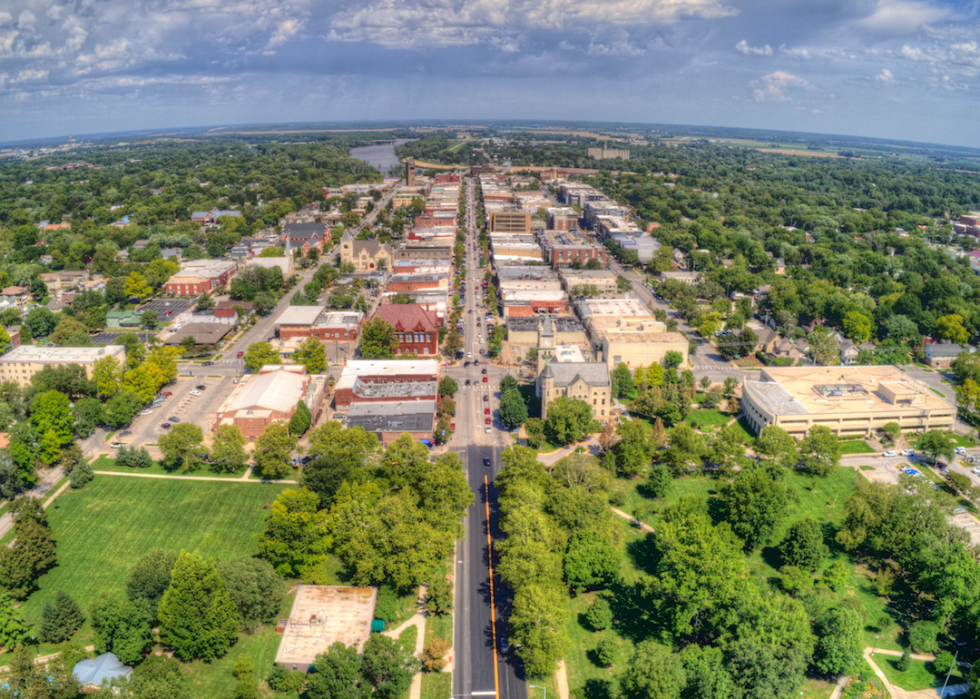
#29. Lawrence, KS
- Transportation policies score: 12 (out of 28 points; 3.5 points above national median)
- Overall city score: 42 (out 100 points; overall city rank: #30)
- State transportation policies score: 1.5 (out of 10 points; state rank: #38)
As sister city to Kansas City, Mo., Lawrence is a college town home to the University of Kansas. The city’s public bus operator, the Lawrence-Douglas County Metropolitan Planning Organization, provides public transportation services to the city and to its surrounding jurisdictions. The city has a car-sharing program with Hertz OnDemand, but no bike sharing to date.
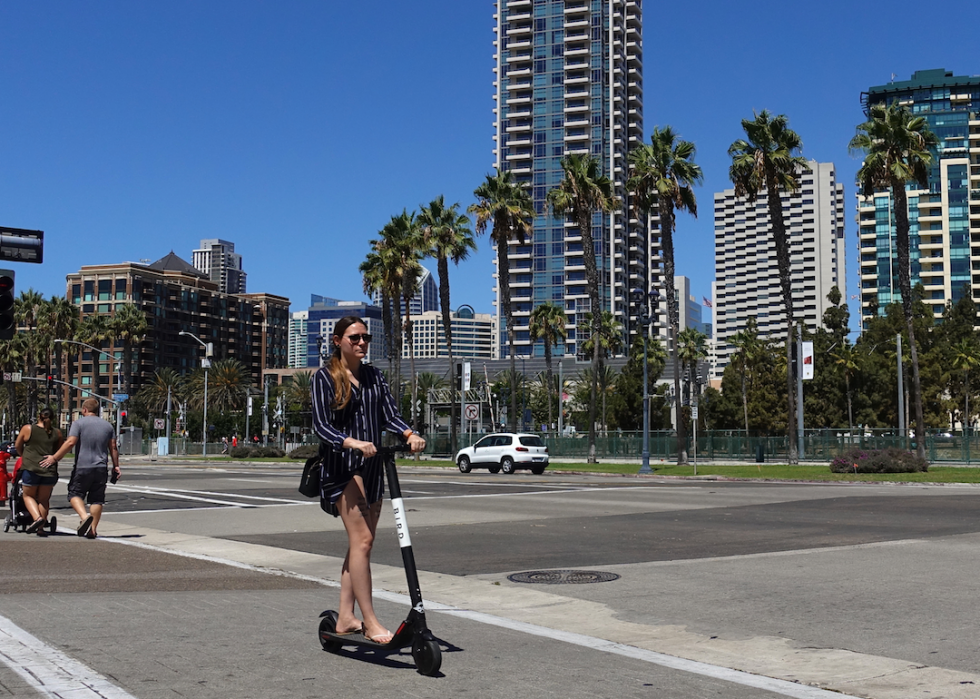
#28. San Diego, CA
- Transportation policies score: 12.5 (out of 30 points; 4 points above national median)
- Overall city score: 58.5 (out 100 points; overall city rank: #15)
- State transportation policies score: 9 (out of 10 points; state rank: #1)
The sister city of Tijuana, Mexico and the home of the United States Navy’s Pacific Fleet, San Diego is considered to be a highly progressive city occupied by professionals. San Diego’s municipal code allows for the zoning of walkable communities, while its Bicycle Master Plan encourages bike sharing. The city’s electricity authority, San Diego Gas & Electricity, runs the “Power Tour Drive” initiative to encourage the development of electric vehicle charging infrastructure.

#27. Boulder, CO
- Transportation policies score: 12.5 (out of 28 points; 4 points above national median)
- Overall city score: 64 (out 100 points; overall city rank: #10)
- State transportation policies score: 4.5 (out of 10 points; state rank: #18)
Boulder is an exurb of Denver. A military and government installation hotspot, the city is also home to the University of Colorado. The city has engaged in a Transportation Master Plan that encourages location-efficient real estate development and density bonuses for specific zoning districts. Boulder also takes part in the eGO car-sharing program and the Boulder B-cycle bike-sharing program. Eco Pass, a discounted bus pass for full-time employees and students; Way to GO, a regional ride-match program; and GO Boulder’s Transportation Demand Management—which offers commute trip reduction programs for the city’s businesses—are all initiatives Boulder has undertaken to reduce road congestion.
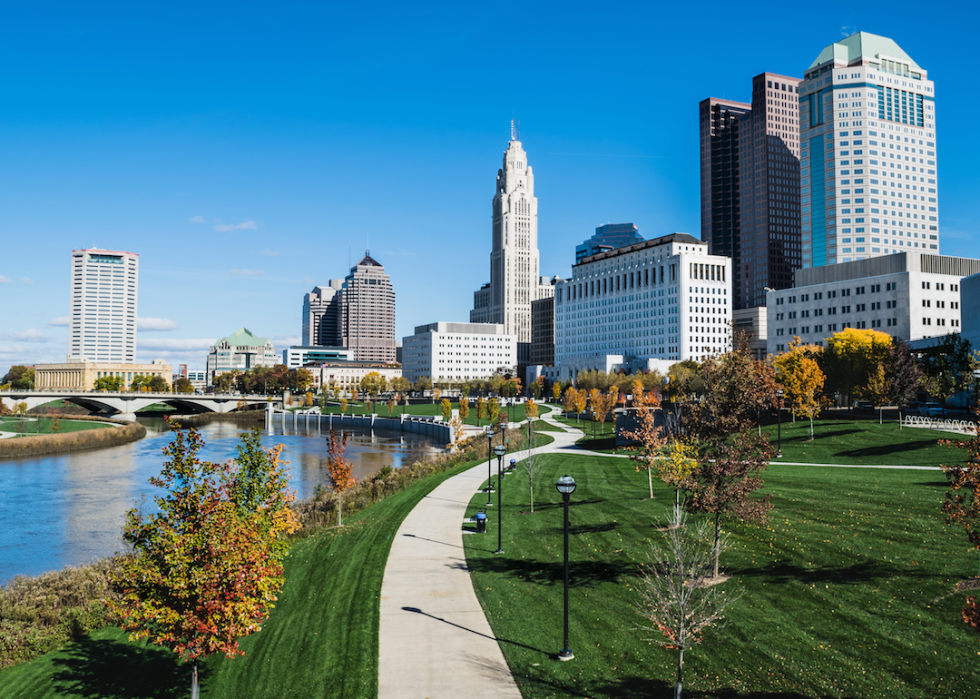
#26. Columbus, OH
- Transportation policies score: 13 (out of 30 points; 4.5 points above national median)
- Overall city score: 41.5 (out 100 points; overall city rank: #31)
- State transportation policies score: 1 (out of 10 points; state rank: #46)
Columbus is the capital of Ohio and the home to the Ohio State University. The city has an energy-efficiency preference for vehicle and equipment purchases. The city has also installed LED lightbulbs on smaller streetlight circuits, has met or exceeded LEED certification for all new city-owned buildings, and has engaged in a municipal planning code that encouraged pedestrian- and transit-friendly development in commercial zones and high-density development in the downtown area. For those who prefer to commute by bike, Columbus engages in CoGo bike-sharing program.
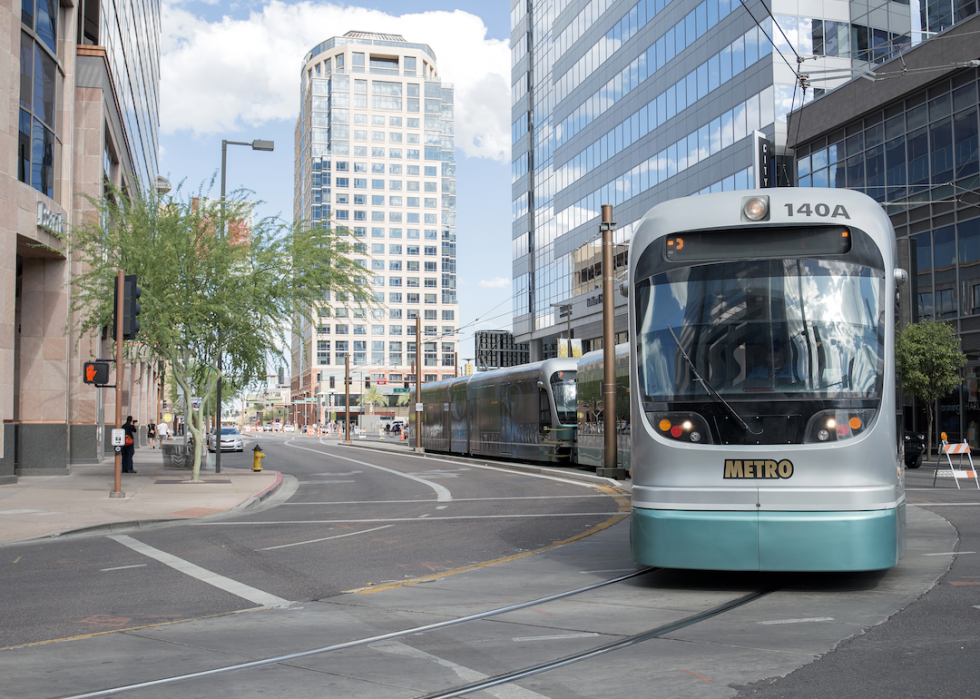
#25. Phoenix, AZ
- Transportation policies score: 13 (out of 30 points; 4.5 points above national median)
- Overall city score: 50.5 (out 100 points; overall city rank: #21)
- State transportation policies score: 4.5 (out of 10 points; state rank: #18)
Phoenix is the capital of Arizona. As the fifth-largest city in the United States, Phoenix is not only the most populous state capital in the nation, but the only state capital with a population of over 1 million residents. The city has started Transportation 2050, which seeks to triple the city’s light rail capacity, ensure transit in every neighborhood, and yield a 40% mode shift by 2050. The complimentary 2050 Sustainable Transportation Goal would reduce transportation emissions by 80% by 2050.
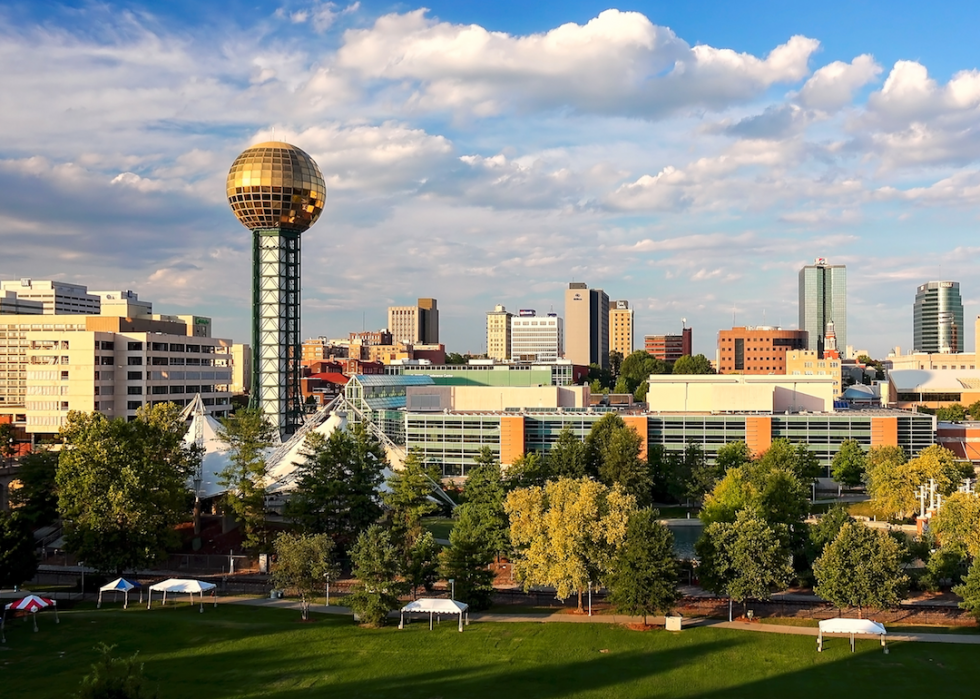
#24. Knoxville, TN
- Transportation policies score: 13.5 (out of 28 points; 5 points above national median)
- Overall city score: 27 (out 100 points; overall city rank: #50)
- State transportation policies score: 3.5 (out of 10 points; state rank: #24)
Knoxville is the home of the Tennessee Valley Authority and the University of Tennessee and is the major city servicing the Oak Ridge National Laboratory. Knoxville has a $2 million fund to create low- and moderate-income affordable rental housing adjacent to public transportation. Pace Bikeshare offers a dockless bike sharing service for Knoxville residents. The city has implemented an Energy and Sustainability Work Plan, where the city provides a free bus pass plan for employees, and it has purchased fuel-efficient vehicles and imposed an anti-idling policy for city vehicles.
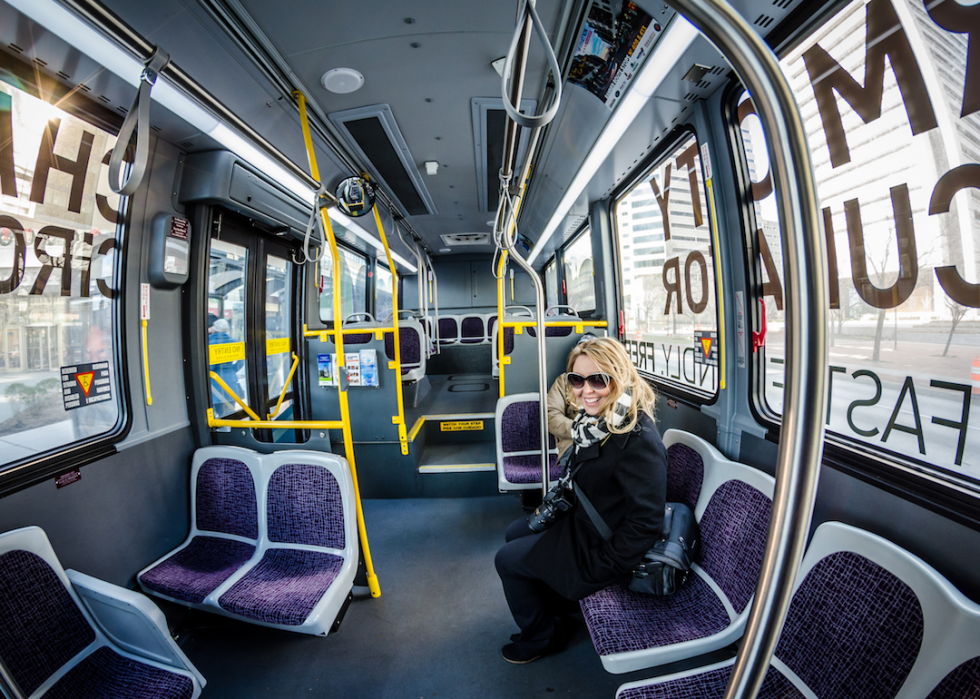
#23. Baltimore, MD
- Transportation policies score: 13.5 (out of 30 points; 5 points above national median)
- Overall city score: 39.5 (out 100 points; overall city rank: #35)
- State transportation policies score: 7 (out of 10 points; state rank: #7)
Baltimore is the largest seaport in the Washington-Baltimore combined statistical area, the largest city in Maryland, the second-largest port-of-entry for immigrants in the nation, and the home of major research facility Johns Hopkins University. The city’s 2019 Sustainability Plan includes a Pedestrian Master Plan to improve walkability in the city, dedicated funding sources for public transportation, and a plan to make more pedestrian-friendly areas and eliminate parking subsidies. It also includes proposed transit hubs that would connect public transit routes and bike-sharing/car-sharing/ride-hailing areas.
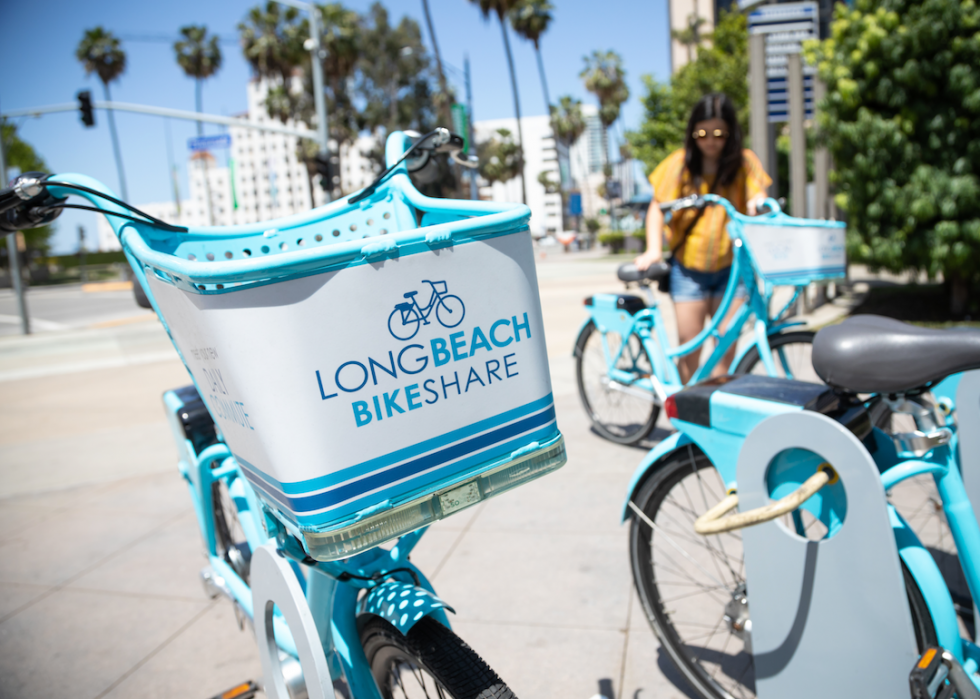
#22. Long Beach, CA
- Transportation policies score: 13.5 (out of 30 points; 5 points above national median)
- Overall city score: 49 (out 100 points; overall city rank: #22)
- State transportation policies score: 9 (out of 10 points; state rank: #1)
Long Beach is an exurb of Los Angeles and the home of the second-largest container port in the nation. It is also the home of California State University, Long Beach. The city’s Sustainable City Action Plan seeks to reduce municipal greenhouse gas emissions by 15% by 2020 and electrical and natural gas use for city operations by 25% and 15%, respectively. The city also adopted the Mobility Element of the Long Beach General Plan, the Communities of Excellence in Nutrition, Physical Activity, and Obesity Pedestrian Plan, and the Bicycle Master Plan to improve the healthiness of the city’s daily vehicle use.

#21. Madison, WI
- Transportation policies score: 13.5 (out of 28 points; 5 points above national median)
- Overall city score: 53.5 (out 100 points; overall city rank: #17)
- State transportation policies score: 0.5 (out of 10 points; state rank: #50)
The capital of Wisconsin, Madison is the home of the University of Wisconsin-Madison and the headquarters of Epic Systems, American Girl, and Lands' End. Madison's Comprehensive Plan amends the city's zoning plan to encourage location-efficient development. The city also permits reduced parking requirements on redevelopment projects, has a car-sharing program through Community Car, and a bike-sharing program, Madison B-cycle.
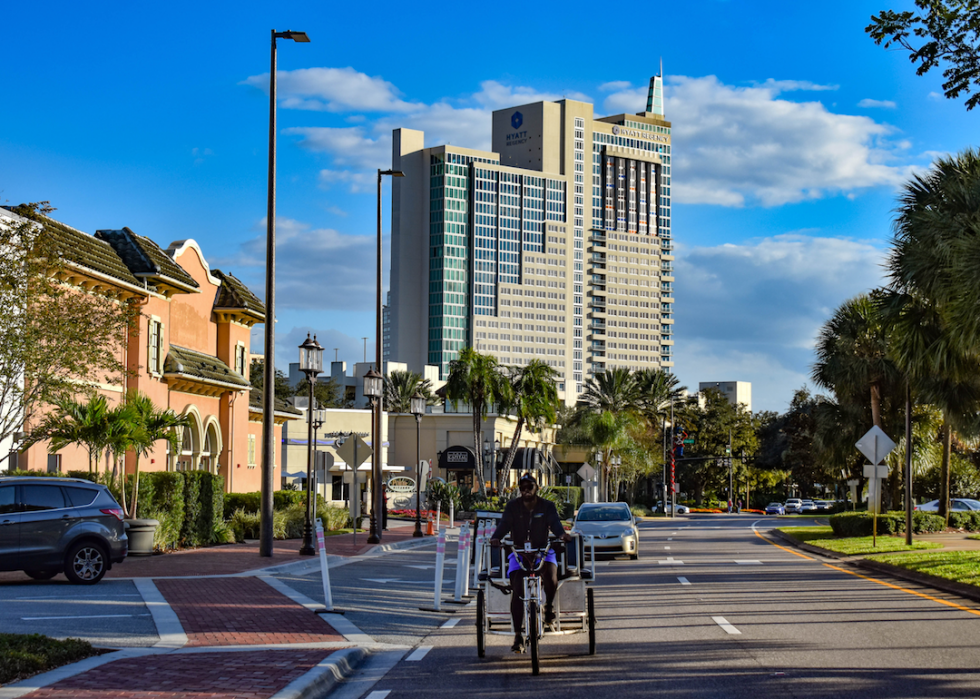
#20. Orlando, FL
- Transportation policies score: 14 (out of 30 points; 5.5 points above national median)
- Overall city score: 51.5 (out 100 points; overall city rank: #19)
- State transportation policies score: 5.5 (out of 10 points; state rank: #12)
The home to Walt Disney World and Universal Studios Orlando, Orlando is located near the geographic center of Florida. The city is home to the University of Central Florida, the largest university in America by on-campus enrolled students. The city’s Community Sustainability Action Plan seeks to reduce transportation energy use and increase pedestrian and bike road access. Orlando was the first city to incorporate maximum parking standards into its municipal code. The city also offers a discount on its impact fees for location-efficient developments.
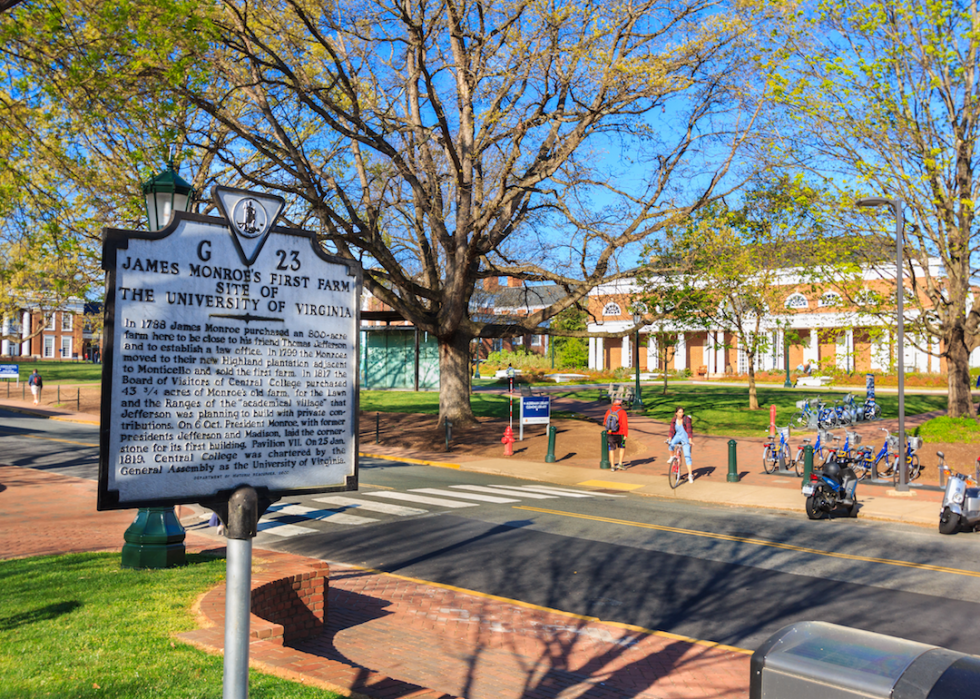
#19. Charlottesville, VA
- Transportation policies score: 14.5 (out of 28 points; 6 points above national median)
- Overall city score: 49 (out 100 points; overall city rank: #23)
- State transportation policies score: 5 (out of 10 points; state rank: #16)
The home of Thomas Jefferson’s fabled home Monticello, Charlottesville is also the home of the school the former president founded, the University of Virginia. The city’s zoning code encourages mixed-used districts for the sake of location-efficient developments. The city has also adopted a Bicycle Pedestrian plan and offers car-sharing through Zipcar and ridesharing.
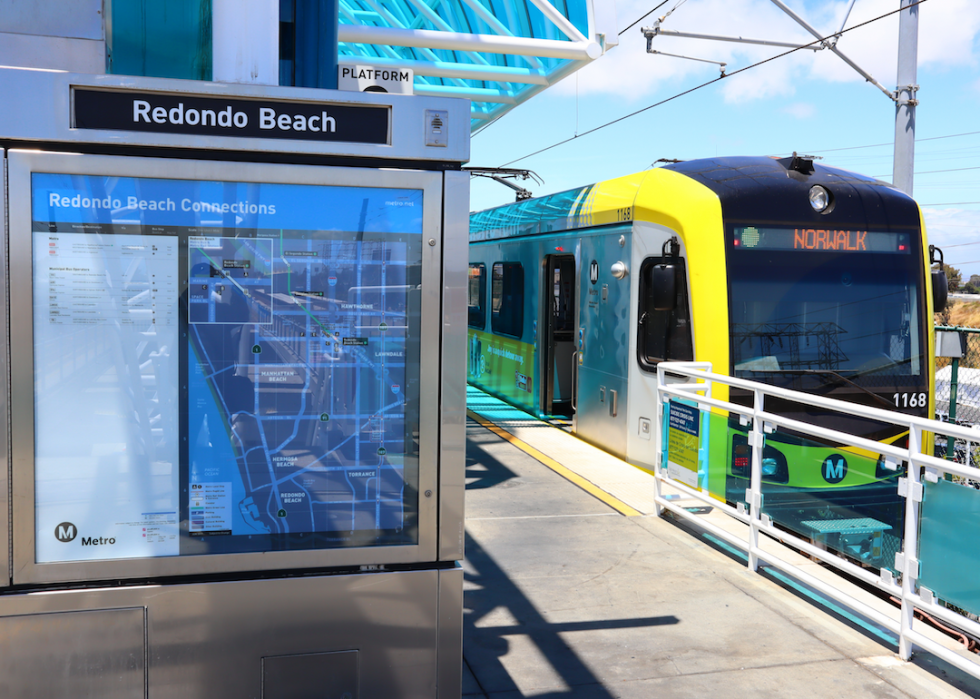
#18. Los Angeles, CA
- Transportation policies score: 14.5 (out of 30 points; 6 points above national median)
- Overall city score: 65.5 (out 100 points; overall city rank: #7)
- State transportation policies score: 9 (out of 10 points; state rank: #1)
The second-largest city in the United States, Los Angeles is the home of the nation’s movie and television production industry. A highly industrial city, Los Angeles is also the home of the University of California, Los Angeles and California State University. The city has a Mobility Plan that promotes the use of alternative mobility options. 15 of the city’s 37 implementation plans encourage location-efficient mixed-use zoning. Los Angeles offers two car sharing programs, Car2Go and Zipcar, and a docked bicycle sharing program. The city also offers rebates for home chargers for electric vehicles and for each hard-wired charger.
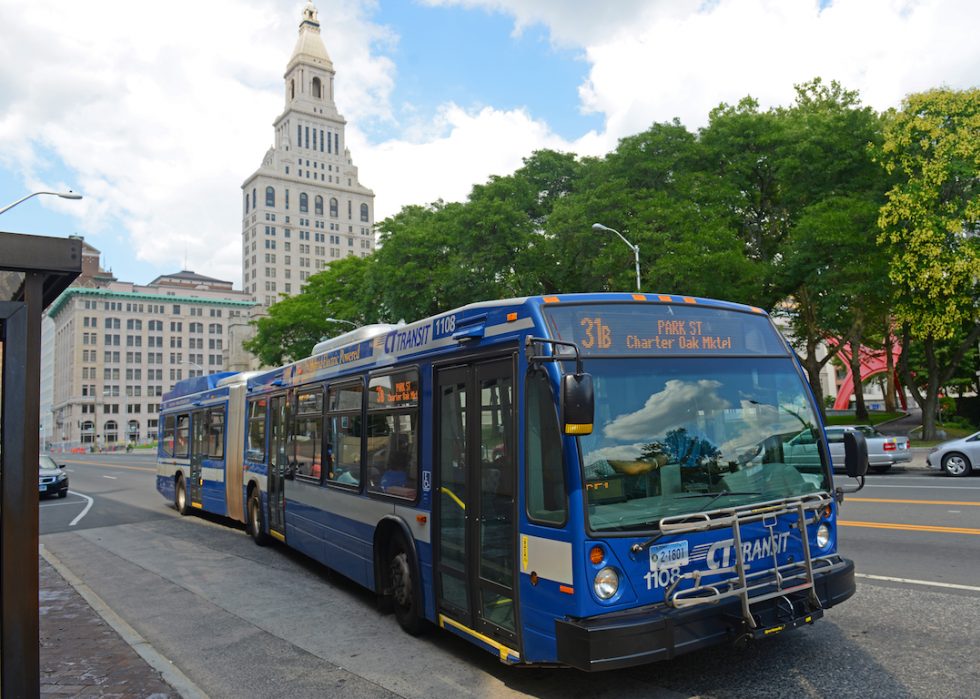
#17. Hartford, CT
- Transportation policies score: 15 (out of 30 points; 6.5 points above national median)
- Overall city score: 43.5 (out 100 points; overall city rank: #29)
- State transportation policies score: 7.5 (out of 10 points; state rank: #6)
An exurb of New York City, Hartford in the capital of Connecticut. The city is also the home of Trinity College. The city’s Climate Action Plan seeks to reduce vehicle miles travelled (VMTs) by introducing a traffic light synchronization program, encouraging businesses to create transportation demand management programs, and improving public transportation and biking alternatives. Municipal code requires compact development to encourage greater development density, particularly around public transit nodes. Hartford offers a dockless bike sharing program, the LimeBike program.
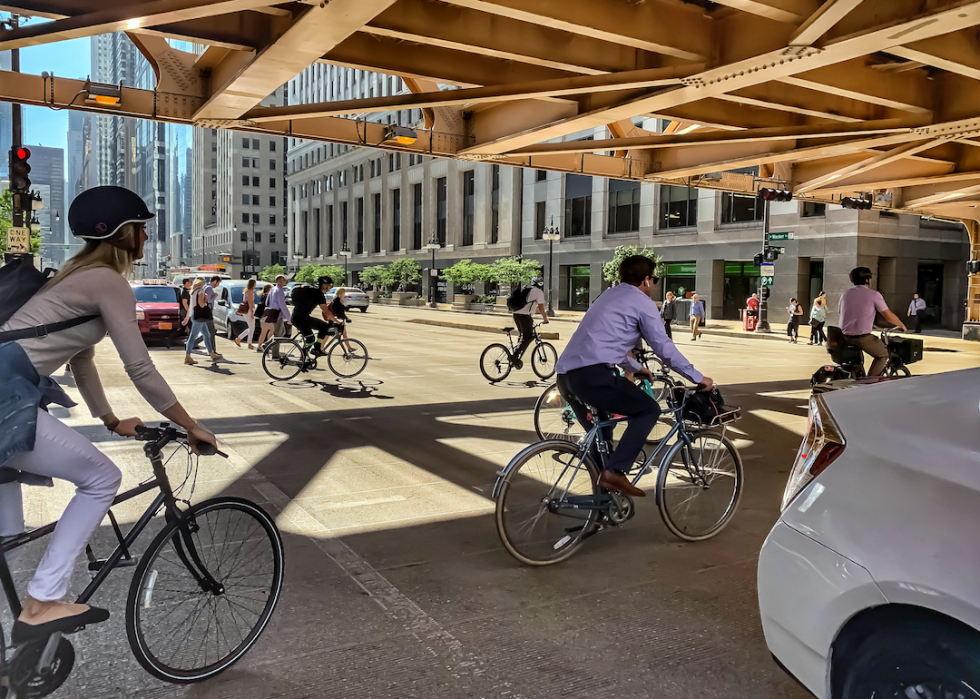
#16. Chicago, IL
- Transportation policies score: 15 (out of 30 points; 6.5 points above national median)
- Overall city score: 56.5 (out 100 points; overall city rank: #16)
- State transportation policies score: 5 (out of 10 points; state rank: #16)
The nation's third-largest city, Chicago is a major transportation and shipping hub, as well as the most-populous Midwestern city. The city is the home of the University of Chicago, Depaul University, Loyola University Chicago, and the University of Illinois at Chicago. Chicago seeks to be the most bike and pedestrian-friendly city in the nation with its Sustainable Chicago 2015 Action Agenda and Chicago Forward transportation plan. The plans seek to add up to 100 miles of bike lanes and introduce bike sharing. The city offers bonuses and review of parking requirements for developments that comply with density requirements near transit zones. Enterprise Carshare and Zipcar service the city, as does the bike sharing program Divvy.
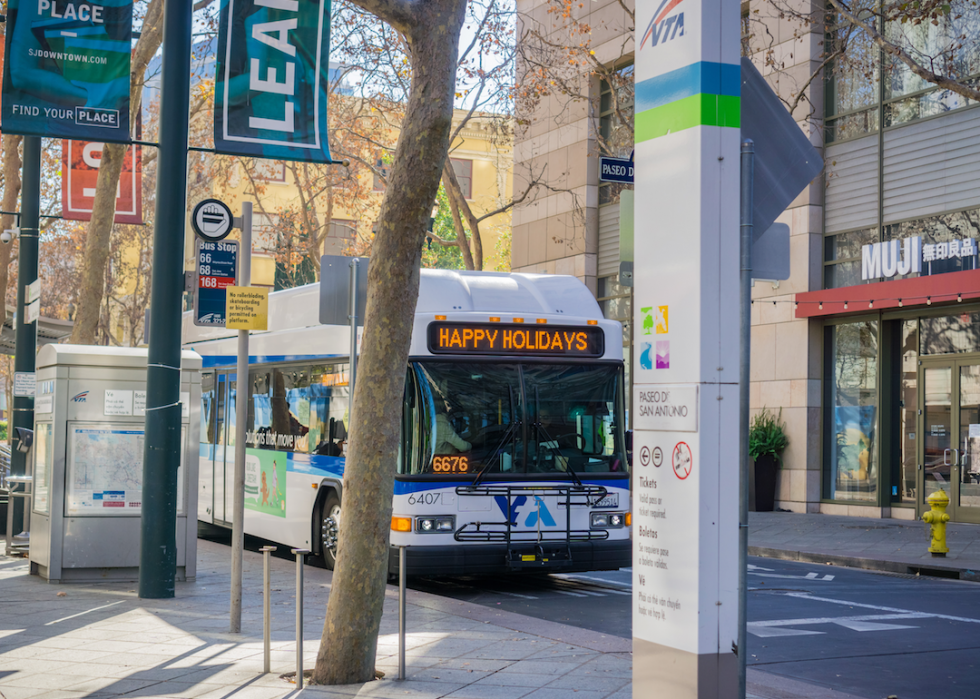
#15. San Jose, CA
- Transportation policies score: 15 (out of 30 points; 6.5 points above national median)
- Overall city score: 62 (out 100 points; overall city rank: #13)
- State transportation policies score: 9 (out of 10 points; state rank: #1)
The largest city in the San Francisco Bay Area, San Jose is the unofficial capital of Silicon Valley. The city has the highest gross domestic product per capita in the nation and the third-highest in the world. PayPal, Adobe, Cisco, eBay, Acer, and Western Digital all call San Jose home, as does San Jose State University. Stanford University and U.C. Santa Cruz are located in nearby suburbs. The city has engaged in several VMT-reduction schemes, such as requiring downtown developments to meet minimum parking rate requirements, developing new neighborhoods that maximize the use of public transit systems, and encouraging high-density, mixed-use developments.
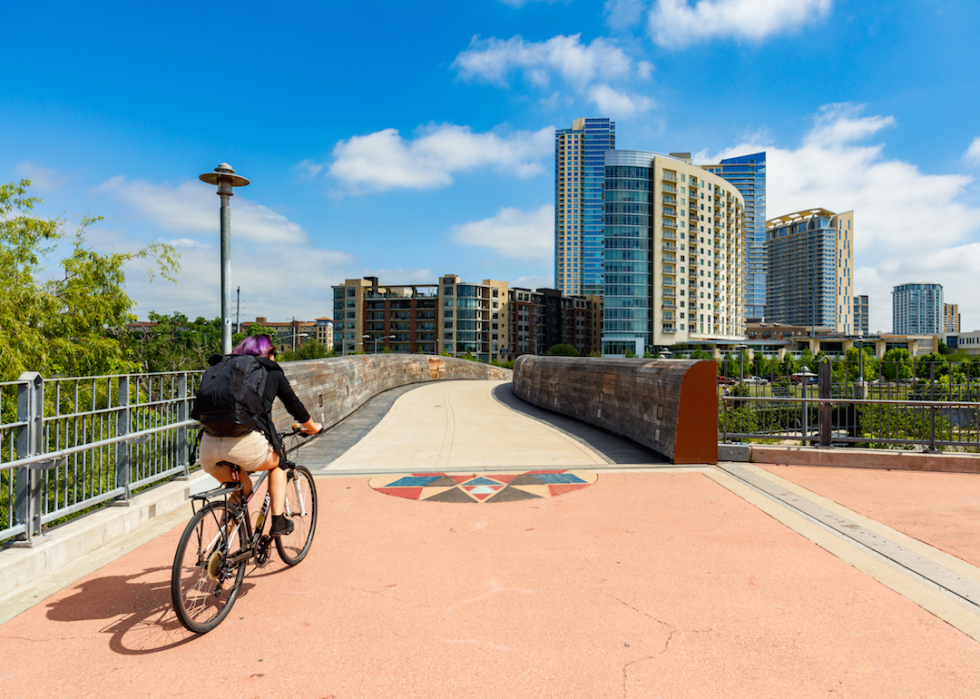
#14. Austin, TX
- Transportation policies score: 15 (out of 30 points; 6.5 points above national median)
- Overall city score: 63 (out 100 points; overall city rank: #11)
- State transportation policies score: 3 (out of 10 points; state rank: #27)
Austin is the capital of Texas. A progressive hot spot in an otherwise conservative state, Austin is the home of the University of Texas at Austin. The city has three plans that outline how it would tackle sustainable transportation: the Imagine Austin Plan, the Urban Trails Master Plan, and the Austin Climate Plan. Austin has engaged in its Safe, Mixed-income, Accessible, Reasonably Priced, Transit-Oriented housing program (SMART) which offers a fee waiver and expedited assistance to affordable housing options that are transit-accessible. Austin offers rebates for vehicle charging systems installed in homes and businesses and provides two car-sharing programs and a bike-sharing program.
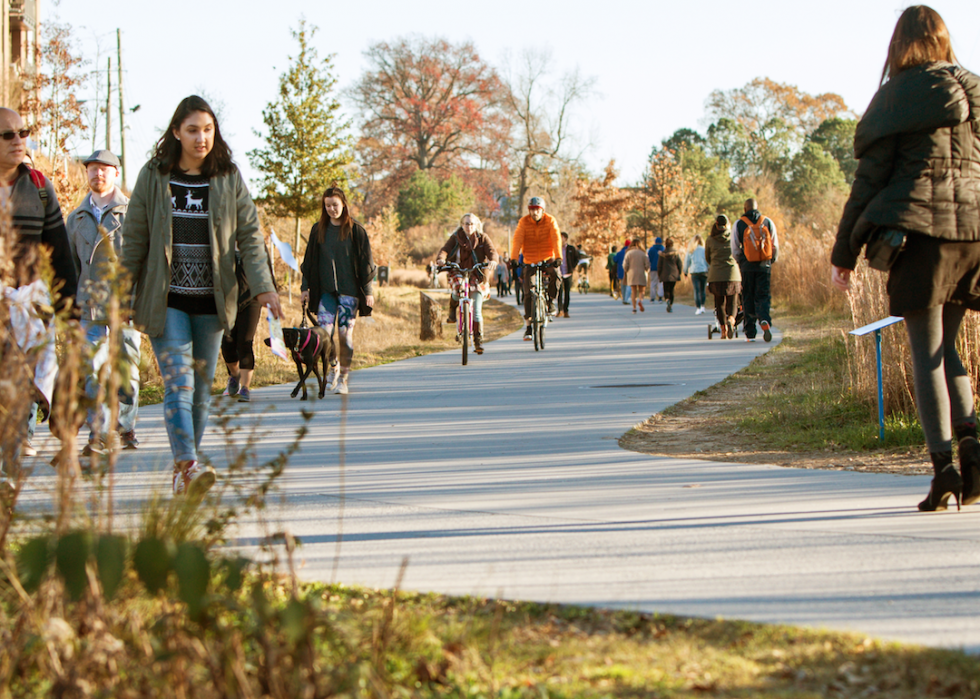
#13. Atlanta, GA
- Transportation policies score: 15.5 (out of 30 points; 7 points above national median)
- Overall city score: 45 (out 100 points; overall city rank: #27)
- State transportation policies score: 4.5 (out of 10 points; state rank: #18)
The capital and largest city in Georgia, Atlanta is considered to be the nucleus of the “New South.” A major transportation hub and home to the largest airport by passenger traffic in the world, Atlanta is also the home of Coca-Cola, CNN, the Georgia Institute of Technology, the University of Georgia, Georgia State University, Emory University, Morehouse College, and Clark Atlanta University. The city’s Climate Action Plan seeks to reduce transportation emissions by 20% by 2020 by expanding the Atlanta BeltLine and building more pedestrian facilities and bike sharing programs. The city offers density bonuses for developers in Buckhead. The city is serviced by two car-share services and a docked bike-share program.
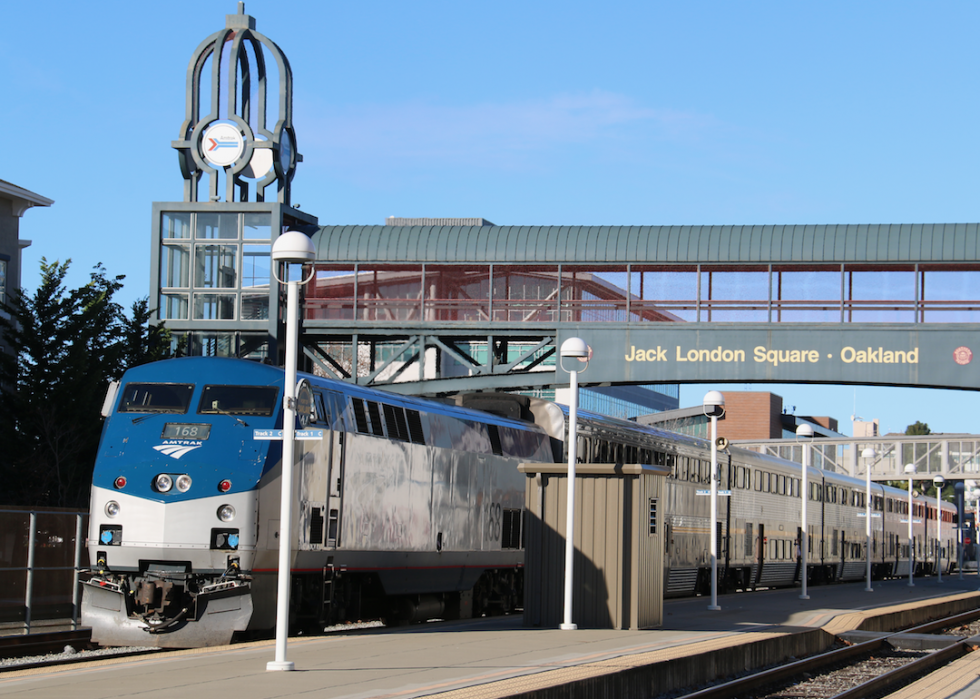
#12. Oakland, CA
- Transportation policies score: 15.5 (out of 30 points; 7 points above national median)
- Overall city score: 59.5 (out 100 points; overall city rank: #14)
- State transportation policies score: 9 (out of 10 points; state rank: #1)
San Francisco’s sister city sits across the Golden Gate Bridge from its bigger and wealthier neighbor. Oakland’s port, however, makes the city the hub of trade for the Bay Area. Oakland is one of the few cities on this list that is not known for its higher learning; however, its proximity to San Francisco and San Jose make the city a major bedroom community for Silicon Valley. The city has implemented a land use plan that would concentrate development in areas where there are existing transit routes. The city has both car-sharing and a bike-sharing programs.
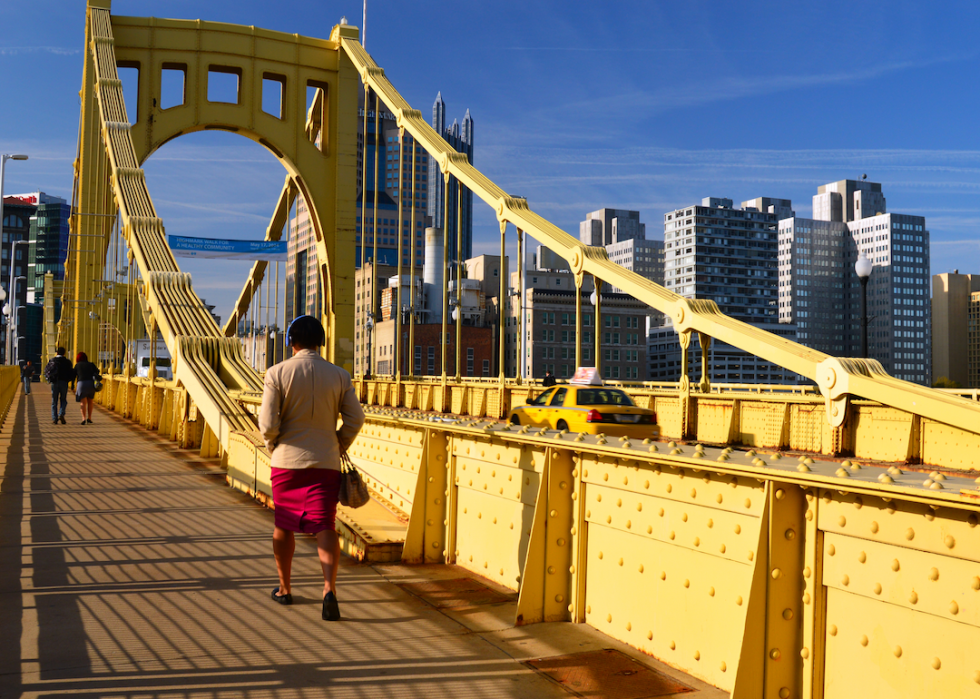
#11. Pittsburgh, PA
- Transportation policies score: 16 (out of 30 points; 7.5 points above national median)
- Overall city score: 46 (out 100 points; overall city rank: #24)
- State transportation policies score: 5.5 (out of 10 points; state rank: #12)
The former steel-producing city of Pittsburgh is a major manufacturing hub, with Apple, Bosch, Facebook, Nokia, Microsoft, and IBM having presences in the city. The city is also the home of Carnegie Mellon University and the University of Pittsburgh. The city's Pittsburgh Climate Action Plan 3.0 seeks to bring VMT per capita down to 50% of the 2013 levels by 2030. The city mandates one parking space per residential dwelling and incentivizes mixed-use development in its Ecoinnovation District. The city offers both car-share and bike-sharing options.
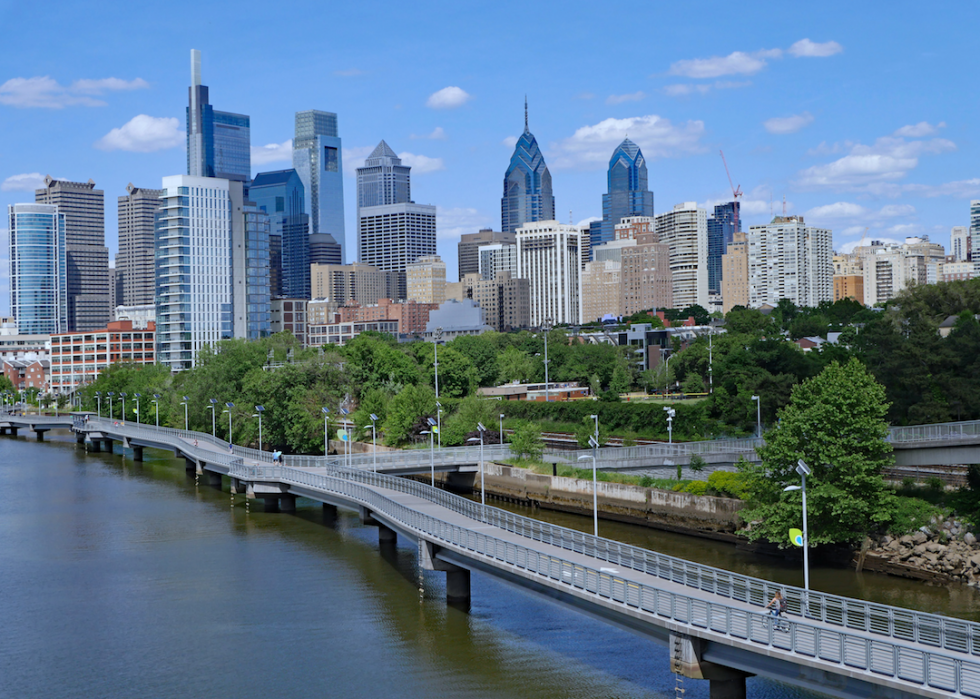
#10. Philadelphia, PA
- Transportation policies score: 16 (out of 30 points; 7.5 points above national median)
- Overall city score: 51 (out 100 points; overall city rank: #20)
- State transportation policies score: 5.5 (out of 10 points; state rank: #12)
The largest city in Pennsylvania, Philadelphia was the nation’s first capital. In the Boston-New York-Washington (Northeast) megapolis, the city is the home of Temple University, Drexel University, and the University of Pennsylvania. Connect, Philadelphia’s strategic transportation plan, seeks to decrease the VMTs per capita by improving street safety and transforming the existing public transportation system. The city has implemented new zoning regulations designed to improve walkability. The city takes part in a bike-sharing program.
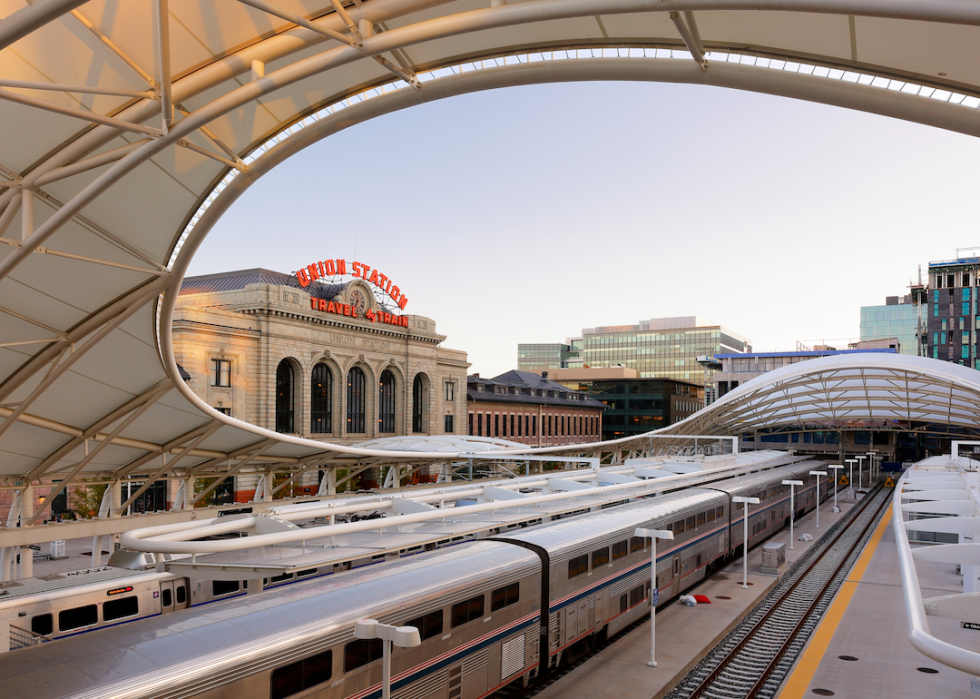
#9. Denver, CO
- Transportation policies score: 16 (out of 30 points; 7.5 points above national median)
- Overall city score: 64.5 (out 100 points; overall city rank: #8)
- State transportation policies score: 4.5 (out of 10 points; state rank: #18)
The capital of Colorado, Denver is one of the nation’s fastest-growing cities. The second-largest city in the Rocky Mountain-region after Phoenix, the city is the home of the University of Colorado Denver and the Denver campus of Johnson & Wales University. The city has a sustainability plan in place that would reduce commuting traffic performed by single-occupancy vehicles to less than 60% of all car trips. The city has also planned to expand the lengths of pedestrian walkways. The city’s Mobility Action Plan seeks to reduce Single Occupancy Vehicle driving rates to less than 50%. The city is serviced by a bike-sharing program and three car-sharing services.
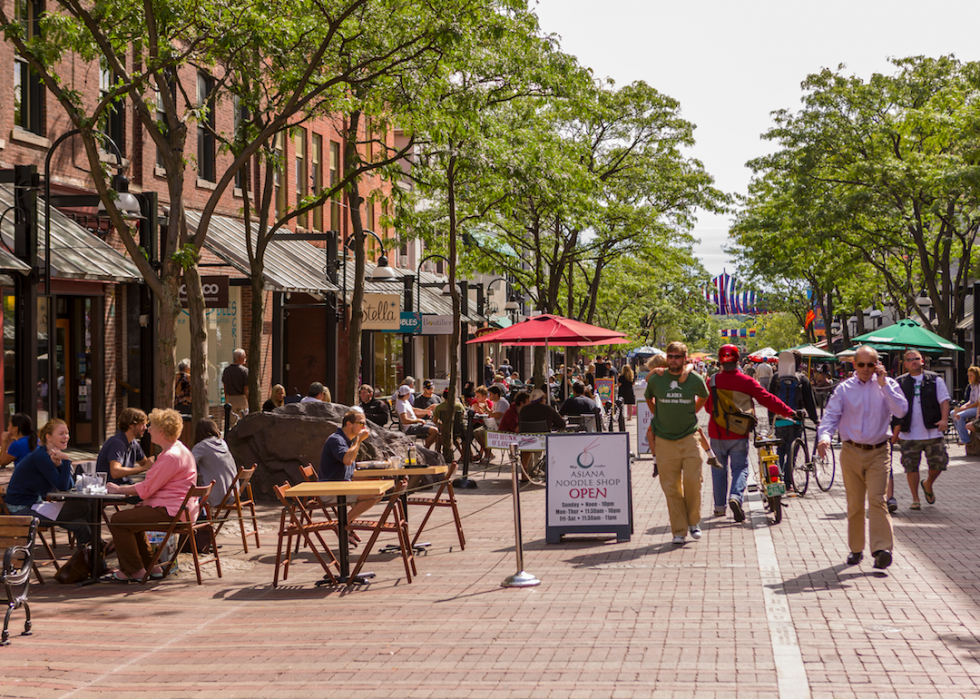
#8. Burlington, VT
- Transportation policies score: 16.5 (out of 28 points; 8 points above national median)
- Overall city score: 52.5 (out 100 points; overall city rank: #18)
- State transportation policies score: 6.5 (out of 10 points; state rank: #9)
The capital of Vermont, Burlington is the smallest city by population on this list. Burlington is the home of the University of Vermont. The city’s Climate Action Plan seeks to reduce VMTs per capita by 2025. The city does not have any zoning codes to encourage mixed-use developments; most of the city’s energy conservation plans regarding the transportation network are planned or not implemented. The city is serviced by a bike-share and a car-share program.
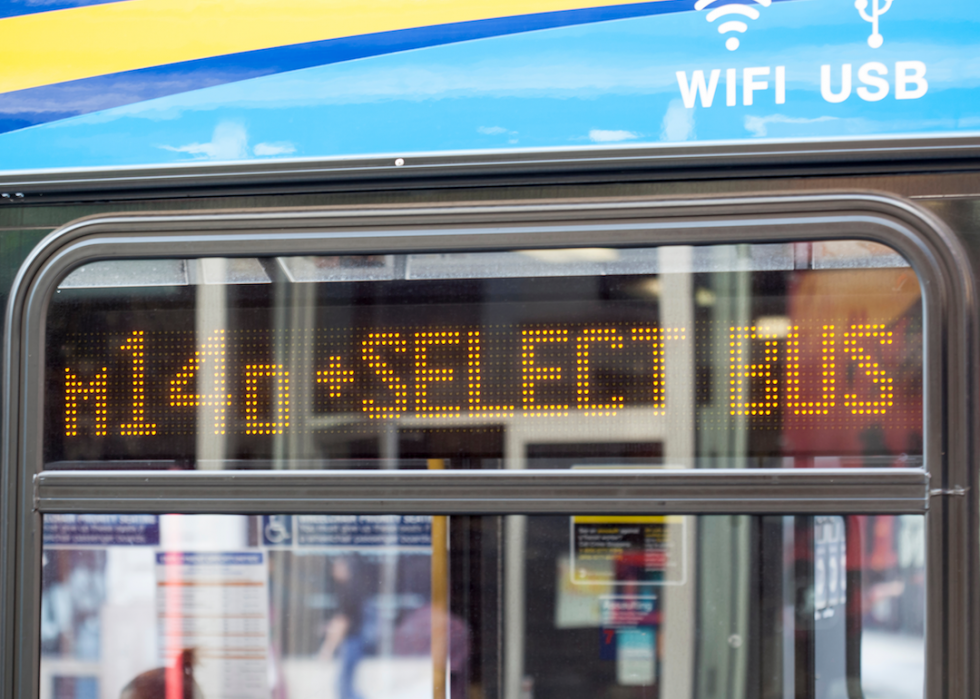
#7. New York City, NY
- Transportation policies score: 20 (out of 30 points; 11.5 points above national median)
- Overall city score: 67 (out 100 points; overall city rank: #6)
- State transportation policies score: 8.5 (out of 10 points; state rank: #2)
New York City is the largest city in the nation, the most-densely populated major city in the nation, the city with the largest metropolitan area in the world by urban landmass, and the hub of one of the largest metropolises in the world. New York City is the home of the United Nations, Wall Street, the largest gateway to legal immigration in the nation, Columbia University, New York University, and over 120 other universities and colleges. New York City has one of the most extensive public transportation networks in the country. The city’s Strategic Plan seeks to improve street safety, expand bike lanes, and change freight management and parking policy. The city’s PlaNYC is creating special-purpose districts for the creation of mixed-use developments. The city has numerous car-sharing and bike-sharing programs, with parking spaces designated for car-sharing.
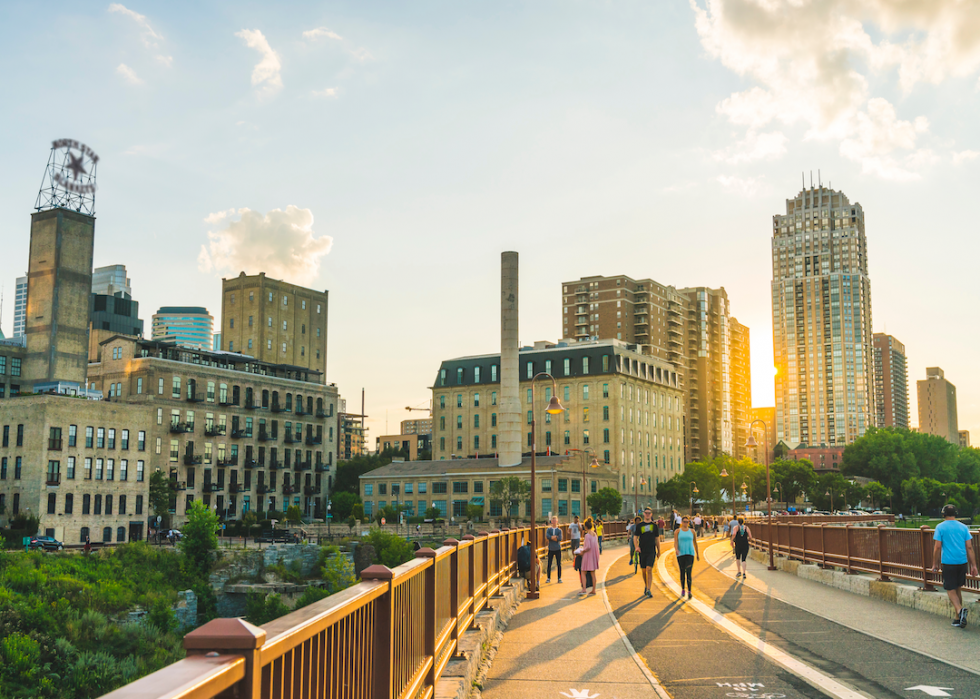
#6. Minneapolis, MN
- Transportation policies score: 20 (out of 30 points; 11.5 points above national median)
- Overall city score: 69 (out 100 points; overall city rank: #4)
- State transportation policies score: 4 (out of 10 points; state rank: #21)
The larger of the Twin Cities, Minneapolis is a major corporate stronghold, being the home of Best Buy, 3M, Target, and General Mills. The largest city between Chicago and Seattle in the Upper Midwest and the Upper Great Plains, Minneapolis is a major economic hub and the home of the main campus of the University of Minnesota. Minneapolis has recently expanded its light rail network. Known for its 13 lakes and a large area of open spaces, the city has sought to expand its pedestrian and bicycle paths. The city incentivizes compact and mixed-use developments, as well as street connectivity. The city has a car-share policy and is serviced by a docked bike-share program.

#5. Seattle, WA
- Transportation policies score: 21 (out of 30 points; 12.5 points above national median)
- Overall city score: 70 (out 100 points; overall city rank: #3)
- State transportation policies score: 7 (out of 10 points; state rank: #7)
The largest city in Washington State and in the Pacific Northwest, Seattle is a hub for technology and the internet. Microsoft, Amazon, and Alaska Airlines are all based in the city, as is the University of Washington. The city’s Transportation Strategic Plan creates urban villages to “support land use goals for compact neighborhoods, encourage planning and designing of city transportation facilities, and establishing multi-modal hubs providing transfer points between transit modes in urban centers and urban villages,” per ACEEE. The city allows car sharing vehicles to park in paid parking spaces without having to pay extra. Despite being commuter-friendly, the city has no bike-sharing services.

#4. Portland, OR
- Transportation policies score: 21.5 (out of 30 points; 13 points above national median)
- Overall city score: 62.5 (out 100 points; overall city rank: #12)
- State transportation policies score: 8 (out of 10 points; state rank: #4)
Portland is the capital and largest city in Oregon, and it is the second-largest city in the Pacific Northwest. With about 60% of all of Oregon’s residents living in Portland, the city is the economic core of the state, with Adidas, Nike, Columbia Sportswear, Dr. Martens, LaCrosse Footwear, and Precision Castparts being based there. The city also hosts Portland State University, the second-largest university by enrollment in the state. The city’s Climate Action Plan seeks to reduce the city’s greenhouse emissions by 53% below the 2006-2007 levels by 2030. The city powers 100% of its municipal operations with renewable energies. The city has a goal of converting 20% of its city fleet to electric vehicles by 2030 and to reduce the miles traveled by car by the average Portlanders to 11 miles per day on average by 2035. The city is serviced by dockless bike-share programs.
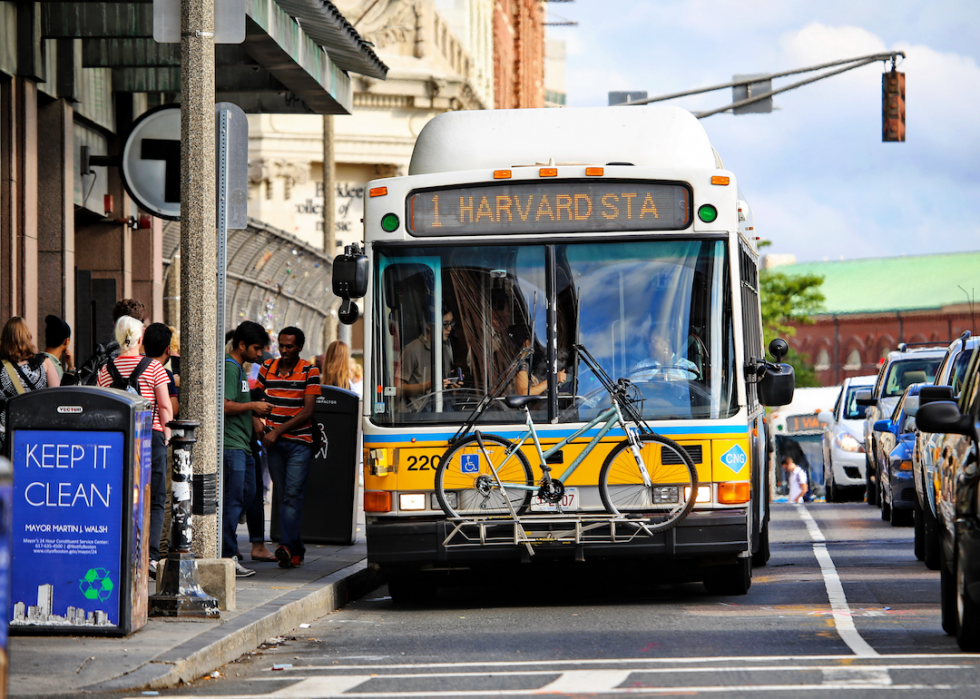
#3. Boston, MA
- Transportation policies score: 22.5 (out of 30 points; 14 points above national median)
- Overall city score: 77.5 (out 100 points; overall city rank: #1)
- State transportation policies score: 8.5 (out of 10 points; state rank: #2)
Boston is the capital and most-populous city in Massachusetts, as well as the most-populous city in New England. One of the oldest cities in the United States, Boston is the home of Harvard University, the Massachusetts Institute of Technology, Tufts University, Boston College, Boston University, Northeastern University, and over 100 other universities and colleges. ACEEE’s top-ranking city for clean energy, Boston’s sustainable transportation plan, Go Boston 2030, seeks to reduce regional VMTs by 5.5% under the 2005 levels by 2020. Projects include demand management programs, bus rapid transit, and new bike connections. The city is serviced by two car sharing services and the Bluebikes bike-sharing platform.
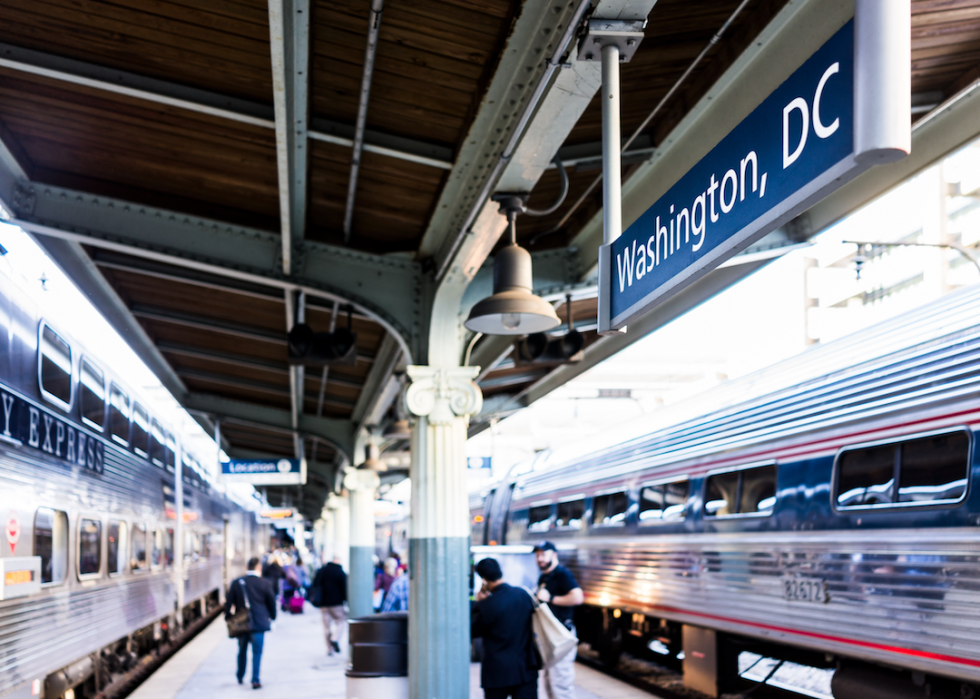
#2. Washington D.C.
- Transportation policies score: 23 (out of 30 points; 14.5 points above national median)
- Overall city score: 68 (out 100 points; overall city rank: #5)
- State transportation policies score: 8 (out of 10 points; state rank: #4)
The nation’s capital, Washington D.C. is unique in the sense that it is the only city in the nation to have both a citizen-based government and to be managed by Congress. All rules and laws approved by the mayor and the city council can be reviewed and overturned by Act of Congress, with its annual budget and taxes requiring Congressional approval. The city is host to American University, Georgetown University, Gallaudet University, and Howard University. A serviceable city on Amtrak’s Acela Express service, Washington, DC is serviced by subway, passenger train, bike-share, and public bus. Sustainable DC 2.0 seeks to reduce greenhouse gas emissions from transportation by 60% by 2032, compared to the 2006 baseline. The city also allows denser development along transit corridors and downtown. The city offers both cars-hare and bike-share services.
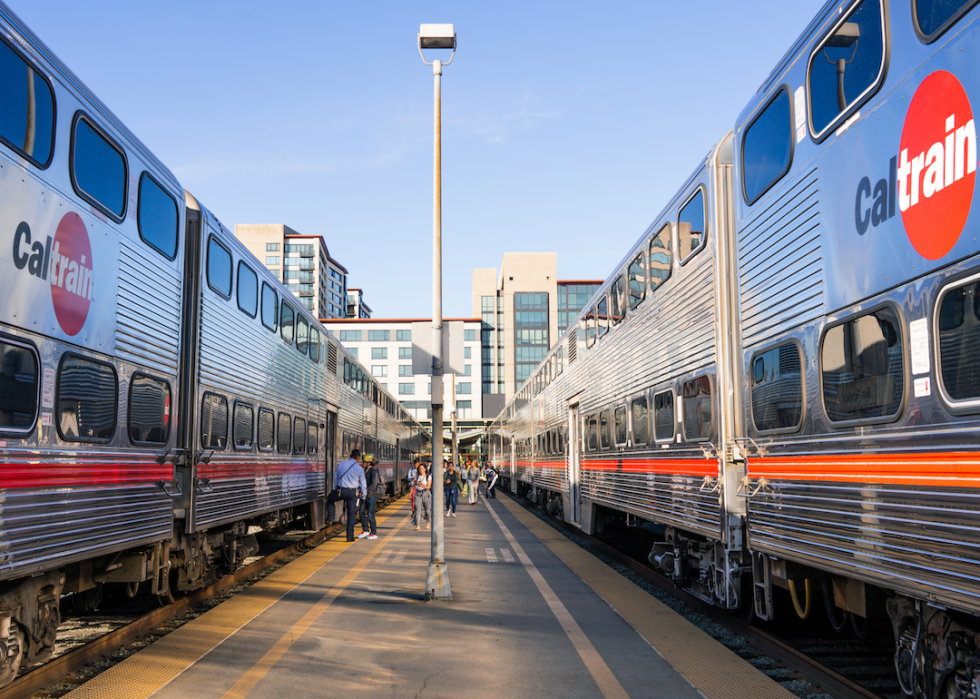
#1. San Francisco, CA
- Transportation policies score: 23.5 (out of 30 points; 15 points above national median)
- Overall city score: 71.5 (out 100 points; overall city rank: #2)
- State transportation policies score: 9 (out of 10 points; state rank: #1)
San Francisco is the namesake of the San Francisco Bay Area and the San Francisco Peninsula. While not the largest city in the area, San Francisco is the most romanticized, and it's the commercial, financial, and cultural capital of Northern California. San Francisco is the county seat of the most densely populated county not to be a New York City borough in the United States. San Francisco is the home of Levi Strauss & Co., Gap, Dropbox, Reddit, Square, Yelp, Twitter, Uber, Lyft, and Pinterest, as well as the University of California, San Francisco and San Francisco State University. The traditional home of the "hippie" counterculture, it is logical that the city would be a leader in energy efficiency. The city's sustainable transportation plan, Connect SF, seeks to transition the city's private vehicle mode to sustainable transport mode. Due to the current housing crisis, the city is incentivized to encourage high-density development, with access to public transit weighing how likely a high density development will be implemented. The homebase of Uber and Lyft, the city has multiple ride-share, car-share, and bike-sharing options. The city, through PG&E, offers rebates for electric vehicles.
You may also like: 15 careers to make the ocean your office



